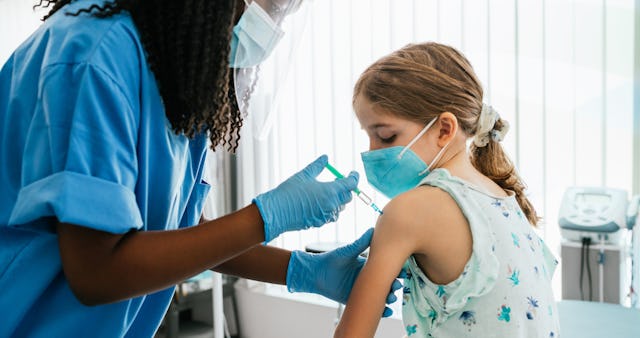Pfizer Vaccine's Effectiveness In Kids Aged 5-11 Declines Rapidly Over Time

New data collected by health officials in New York State points to “rapid loss of protection against infection, in the omicron variant era.”
After learning earlier this month that Pfizer is pausing their request for FDA approval of their COVID-19 vaccine for ages 2-5, and in the midst of a flurry of announcements about mask mandates in different parts on the country, parents were met with yet another blow Monday. As if we hadn’t taken enough of those already.
Pfizer-BioNTech’s vaccine, the only one approved for use in kids aged 5-11, loses effectiveness at a disconcertingly steady pace, according to new data collected between Dec. 13, 2021 and Jan. 31, 2022 by researchers at the New York State Department of Health. Included in the study were 852,000 vaccinated children aged 12-17, and 365,502 vaccinated children aged 5-11. During this time period, vaccine effectiveness against infection declined from 66% to 51% in the 12-17 age group, and from 68% to a 12% in the 5-11 age group.
In light of the fact that the data was collected during the omicron surge, it is not surprising that vaccinated children were infected, as this variant has been proven itself to be particularly effective in causing breakthrough infections in vaccinated adults, too.
Vaccine effectiveness against hospitalizations was also found to decline: from 85% to 73% in children 12-17, and from 100% to 48% in children ages 5-11. It should be noted, however, that because the overall number of children hospitalized due to COVID is very small, these numbers are considered less reliable than those for vaccine effectiveness against infection.
Another limitation to the data concerns the availability of home tests. Since some children tested positive at home and were not seen for care in a hospital, their positive cases would not be included in this data.
While these certainly aren’t the results that parents and pediatricians were hoping for, the study’s authors concluded that “vaccination of children 5-11 years was protective against severe disease and is recommended.”
Although disappointing, this data may pave the way to a more effective dosing schedule for children, as the data was further broken down by each year of age. Researchers found, for example, that 11 year olds who receive a third of the dose that children 12-17 get only had a vaccine effectiveness rate of 11% by the week of Jan. 24-30, while 12 year olds who received the higher dose had a vaccination effectiveness rate of 67%.
“Should such findings be replicated in others settings, reviews of the dosing schedule for children ages 5-11 years appear prudent,” said the authors of the study.
Bottom line? Vaccinating your children protects them from severe illness and hospitalization, and slows the spread of the virus, although not for as long as we had hoped it would.